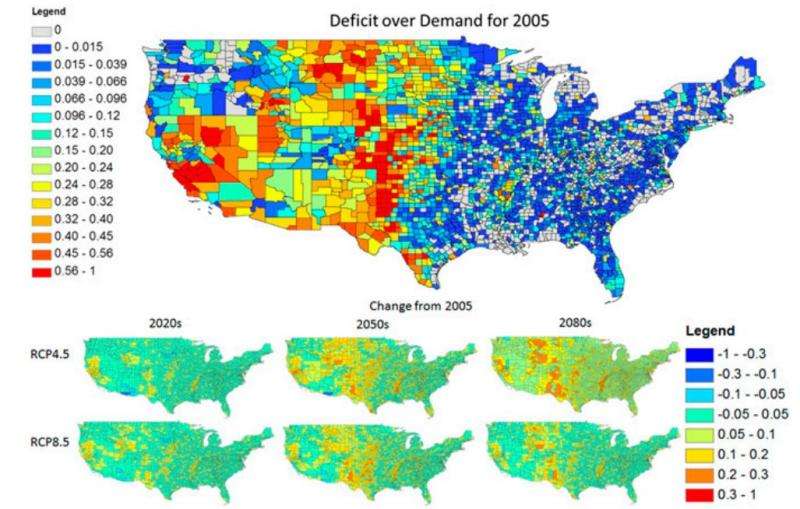August 4, 2015 report
Computer simulation shows climate mitigation schemes could result in increased water stress

(Phys.org)—A combined team of researchers from Pacific Northwest National Laboratory and the University of Maryland has created a computer simulation meant to show the degree of water stress in the U.S. going forward into the future—it shows that under some conditions, water stress may actually increase due to mitigation efforts designed to slow global warming. In their paper published in Proceedings of the National Academy of Sciences, the team describes their simulation and why they believe it shows the dangers of not clearly thinking through strategies meant to help reduce greenhouse gas emissions.
Scientists understand that increasing global temperatures will mean an increase in evaporation, which in turn will likely mean more droughts, and perhaps permanent reductions in rainfall in some places. The thinking has been that if measures are taken to reduce greenhouse gas emissions, slowing heating, that should slow increases in evaporation and easing water stress. But, that thinking may not always work, the researchers suggest. Their simulation shows that under some scenarios, reducing greenhouse gas emissions might actually make the water problem worse in some places.
The problem, is that one of the main scenarios for reducing greenhouse gas emissions involves growing bioenergy crops (such as corn or switchgrass) to replace coal fired power plants—a move that would certainly reduce the amount of carbon sent into the atmosphere. But, it would also mean diverting water to those crops, instead of using it for the immediate needs of an ever expanding human population. The result, the team says, would be increased water stress. One simulation showed water consumption increasing by 42 percent across the U.S. by the year 2100, a lot of which would go to growing bioenergy crops. This would be an example, they claim, of green policies causing more water stress than climate change itself.
The simulation was able to actually show water deficits across the country by county, which tended to show problem areas in the Plains and Midwest as we move into the middle and latter parts of this century. It, the team suggests, may offer critics of using bioenergy sources as a means for slowing global warming, a strong argument.
More information: 21st century United States emissions mitigation could increase water stress more than the climate change it is mitigating, Mohamad I. Hejazi, PNAS, DOI: 10.1073/pnas.1421675112
Abstract
There is evidence that warming leads to greater evapotranspiration and surface drying, thus contributing to increasing intensity and duration of drought and implying that mitigation would reduce water stresses. However, understanding the overall impact of climate change mitigation on water resources requires accounting for the second part of the equation, i.e., the impact of mitigation-induced changes in water demands from human activities. By using integrated, high-resolution models of human and natural system processes to understand potential synergies and/or constraints within the climate–energy–water nexus, we show that in the United States, over the course of the 21st century and under one set of consistent socioeconomics, the reductions in water stress from slower rates of climate change resulting from emission mitigation are overwhelmed by the increased water stress from the emissions mitigation itself. The finding that the human dimension outpaces the benefits from mitigating climate change is contradictory to the general perception that climate change mitigation improves water conditions. This research shows the potential for unintended and negative consequences of climate change mitigation.
Journal information: Proceedings of the National Academy of Sciences
© 2015 Phys.org


















